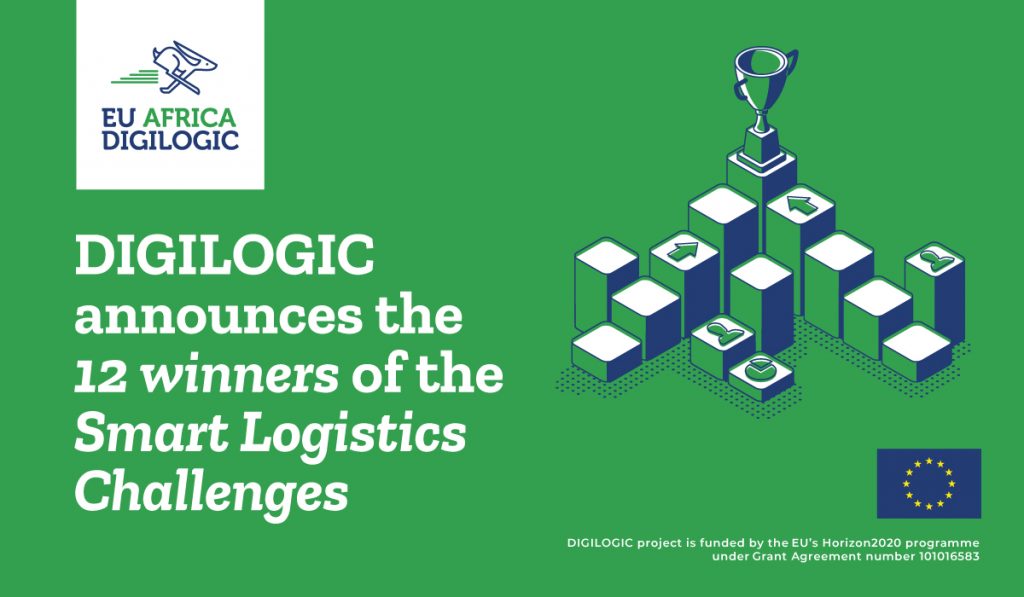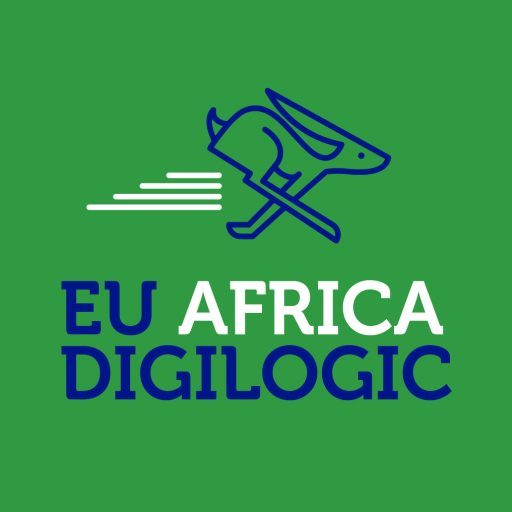
DIGILOGIC announces the 12 winners of the Smart Logistics Challenges
On 1st May, DIGILOGIC opened a call for proposals to address challenges in digital logistics in Africa, Europe, and between the two continents. The call closed on 31st August. Eighty proposals were received. 12 teams from 5 countries were selected through an evaluation process that involved six of the organizations in the DIGILOGIC consortium and lasted until 3rd October.
Auto-Truck(Kenya) plans to save energy and time in the transportation of goods with its eco-cart, which it will produce locally to create local employment. Deft Pal (Ghana) aims to introduce a point-of-sale and inventory management platform that is all-inclusive, allowing a seamless flow of data and information between suppliers, customers and transporters. Duniya (Zambia) aims to introduce an app that allows pharmacies and hospitals to order medicines and medical supplies from their trusted local manufacturers and wholesalers. The target is that orders on the Duniya app are processed and delivered within 24 hours of confirmation of the order.
Farmisphere (Nigeria) is focused on improving fresh food logistics with its iSmart delivery cold box, which can be attached to delivery bikes and trunks of vehicles. Instadriver (Kenya) aims to address the current prevailing situation that employers search for drivers in the wrong places, such as everyday social media platforms. Instadrivers intends to set up a driver-employer marketplace that enables employers to hire competent and verified drivers in less than 10 minutes. Mwingi (Kenya) is focused on the problem that very remote areas far from paved road networks are underserved because there are no established supply chains. Mwingi’s innovative business idea is the aggregation of demand for FMCGs in remote areas, such as cooking oil, flour, rice, sugar, etc. Radava (Kenya) aims to address the challenge that due to the lack of structured markets, smallholder farmers in sub-Saharan Africa fail to market their products and manage price risk effectively. For instance, the oversupply situation at the markets at the time of crop harvest forces millions of smallholder farmers to sell their produce at depressed prices. Trotro (Ghana) aims to introduce aims to provide a trusted, fast and convenient on-demand transportation service. This is achieved through organizing data with the help of machine learning via a simple web app and mobile app for Android and IOS devices where users can download and access the database offline. Trusty (Italy) is focused on applying blockchain to reduce information gaps between farmers and consumers. This involves improving the collection and traceability of information along the supply chain in total security, making the data collected accessible to all, and enhancing over time the contribution that each partner makes for the improvement of the supply chain. Vinmak (Ghana) aims to provide end-to-end solutions to smallholder farmers by creating access to information, credit, mechanization services, input and market along the value chain for cowpea, maize, rice, soybeans, etc. value chain. Wadonge (Kenya) is focused on reducing food losses for retail vendors of fresh produce. Wadonge aims to reduce the high food prices by reducing the 40 percent losses of perishable goods that are covered by increasing food prices. Wadonge aims to address these problems with its Nitume Sokoni app. Nitume Sokoni means send to market in Swahili. Yaaka (Zambia) aims to address the need for access to clean energy all along supply chains. Its targets are to be 50 percent cheaper than current charging kiosks through 80 percent efficiency in energy. This involves specific charging ports which avoid overcharging or less charging which affects batteries. Thus, aiming for the lowest possible overall carbon footprint.
Together, the 12 selected teams address many of the wide range of challenges in digital logistics from the local production of more efficient vehicles to the supply of information and energy throughout value networks that encompass urban areas and remote regions. The innovators will be mentored and supported by DIGILOGIC partners to develop and scale up their solutions.
Stay tuned to know more!
Subscribe to the DIGILOGIC newsletter and Follow us on Twitter, LinkedIn and Facebook.
Selection Criteria:
Digilogic invites proposals focused on digital logistics in one of four phases of the value chain:
warehousing
transportation
point-of-sale
end-user experience
Timeline
Challenges Launch
DIGILOGIC Call for Challenges will be published and widely promoted, detailing the scope, the objectives, the structure of the proposals and of course the benefits for the selected teams.
May 2022
August 2022
Submissions Close
The last day for submission of proposals is 31st August 2022.Proposals Evaluation
Each proposal will be evaluated by at least two reviewers. The selected 12 smart logistics projects will be announced and will enter into the DIGILOGIC Digital Innovation Hubs mentoring, monitoring and implementation programme.October 2022
November/December 2022
DIGILOGIC Bootcamp
The 12 selected teams will be invited to attend DIGILOGIC 3-Day Bootcamp to meet a cohort of experts (technology experts, industry, investors), work together to refine their solutions and finally pitch their project.
Projects Implementation
Each project will be associated to a mentoring DIH to ensure constant monitoring of the work progress, resolution of bottlenecks and support. Mentoring and facility usage vouchers will be granted to the 12 teams while DIGILOGIC will work to connect the innovators with experts, potential clients and additional resources.
2023
October 2023
Demo Day
The best-developed projects will be invited to showcase their results at DIGILOGIC Demo Day, possibly co-located with a major relevant event to facilitate their uptake.

